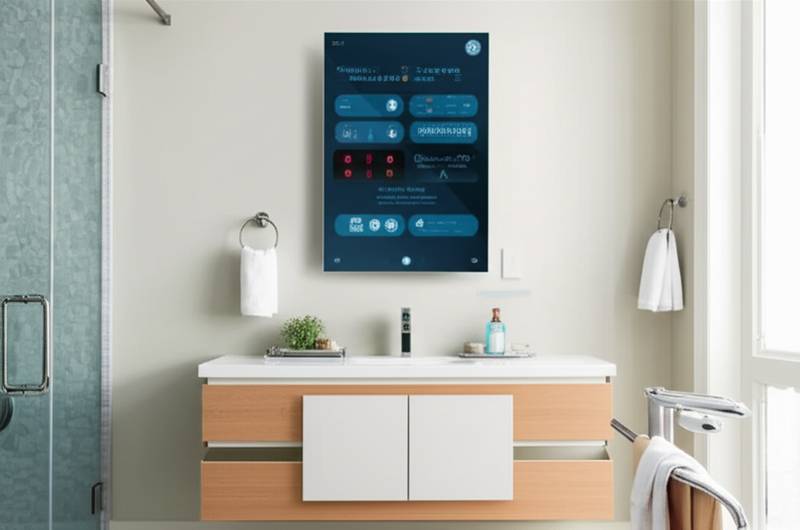Smart Mirrors: Real-Time Health Checks at Home
Smart homes evolve beyond mere convenience. They serve as active partners in personal wellness. The smart mirror stands out as a key innovation in this domain. This device functions as a reflective surface that delivers real-time health insights alongside visual reflection. Users gain access to data on heart rate, skin condition, and posture. Such features transform routine activities into moments of proactive self-care.
The Rise of Reflective Health Technology
The traditional bathroom mirror anchors morning rituals. Contemporary versions elevate this role into a diagnostic instrument. They integrate beauty, health, and advanced technology seamlessly. Embedded sensors, cameras, and artificial intelligence monitor vital indicators. These include body temperature, hydration levels, and postural alignment. Certain models link with complementary devices, such as smart scales or wearable fitness trackers. This connectivity forms a comprehensive wellness dashboard within the household.
Market research highlights surging interest in at-home health monitoring. Individuals pursue proactive strategies for wellbeing management. The smart mirror aligns with this shift by combining utility and everyday familiarity. Users engage with it through standard habits. No additional applications or gadgets require mastery. Data collection occurs unobtrusively during routine tasks like grooming.
Capabilities of Modern Smart Mirrors
Advanced smart mirrors extend well past basic reflection. They deliver precise measurements and insights. Key functions include the following:
- Skin health tracking: Detection of dryness, discoloration, or blemishes through high-resolution imaging.
- Heart rate and oxygen monitoring: Assessment via non-invasive facial scans using optical sensors.
- Posture and symmetry evaluation: Analysis to identify imbalances and suggest corrective exercises.
- Personalized guidance: Tailored advice on skincare regimens, hydration intake, or stress reduction techniques.
Consider a flagship model from a prominent health technology firm. It employs facial recognition paired with infrared sensors. These tools identify variations in circulation or skin tone. Upon detecting signs of elevated stress, the mirror proposes targeted interventions. Options range from guided breathing sessions to customized skincare applications. This interactivity positions the mirror as a dynamic wellness ally.
Users benefit from immediate, context-aware feedback. For example, after a morning wash, the device might highlight dehydration based on skin analysis. It then recommends a specific water intake goal for the day. Such precision fosters consistent health improvements without disrupting daily flow.
Seamless Integration of Daily Health Data
Conventional health monitoring relies on dedicated devices or user-entered information. Smart mirrors streamline this process through passive data acquisition. Information gathers effortlessly during activities like teeth brushing or outfit selection. This integration enhances appeal for time-constrained individuals.
Collected metrics synchronize with smartphone health applications. Users review long-term patterns, identify emerging trends, or generate reports for medical consultations. In family settings, multiple members access routine assessments. This approach embeds preventive care into habitual practices. Early detection of concerns becomes feasible without external appointments.
To maximize value, select mirrors compatible with popular ecosystems like Apple Health or Google Fit. Regular firmware updates ensure data accuracy and new feature additions. Over time, aggregated insights reveal correlations, such as how sleep quality influences morning posture readings.
Addressing Privacy in Connected Health Devices
Connected devices process sensitive biometric information, raising valid privacy questions. Robust encryption and on-device storage prove essential for user trust. Individuals demand monitoring benefits without exposure risks.
Leading manufacturers implement responsive features. Privacy toggles allow data collection pauses. Offline modes support basic functions without internet reliance. Transparent policies detail data handling practices. As these measures standardize, adoption rates increase. Confidence in protection mechanisms drives broader acceptance.
Evaluate device specifications before purchase. Look for certifications like GDPR compliance or independent security audits. These assurances minimize vulnerabilities in home environments.
Building Intelligent Bathroom Ecosystems
Innovative smart mirrors integrate into expansive bathroom networks. These systems incorporate adjustable lighting, climate controls, and voice-activated assistants. Picture a mirror that initiates your day with a sleep quality recap. It modulates ambient light to optimize skin visibility. Simultaneously, it sets a personalized hydration target based on overnight data.
This orchestration elevates the bathroom to a responsive wellness center. Components communicate to create cohesive experiences. For instance, if posture analysis indicates tension, the mirror might cue relaxing audio through integrated speakers. Such synergy enhances overall comfort and health outcomes.
Brands like HiMirror or Simplehuman pioneer these ecosystems. Their products offer modular expansions, allowing gradual upgrades. Start with a core mirror unit, then add compatible elements for full immersion.
Embracing Home Health Monitoring with Smart Mirrors
Smart mirrors transcend novelty as practical tools for accessible health awareness. They weave seamlessly into daily existence, promoting sustained wellbeing. Advancements in precision and cost reduction position them for widespread integration in contemporary residences.
Individuals constructing connected homes find value in these devices. They deliver actionable insights that inspire mindful practices. Proactive habits emerge naturally, underscoring innovation's role in enriching everyday life. Begin by assessing your wellness priorities. Choose a model that aligns with specific needs, such as skin-focused analysis or cardiovascular tracking. This step initiates a journey toward empowered, informed self-care.
